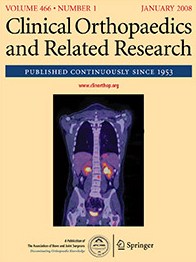
TRAUMA
Effect of Teriparatide on the healing of femoral neck fractures remains uncertain
This report has been verified
by one or more authors of the
original publication.
Clin Orthop Relat Res. 2016 May;474(5):1234-44
161 men and postmenopausal women undergoing treatment with internal fixation for a unilateral femoral neck fracture resulting from a low-trauma event were randomized in two concurrent trials to receive either Teriparatide or a placebo once daily for 6 months. This study was conducted to determine if the benefits observed in revision rates, radiographic healing, and clinical outcomes with the use of Teriparatide in preclinical and preliminary clinical data were replicable in a hip fracture patients. Due to the slow accrual of patients enrollment was stopped early in these trials well before the planed sample size was reached. The analysis of the patients who were enrolled indicated that the use of Teriparatide did not provide a reduction in the risk of revision surgery, improve signs of radiographic healing, or decrease pain when compared to a placebo. These results should be interpreted with caution as the small sample size limited the power of this study to detect potential differences. Larger well designed randomized controlled trials are needed to further investigate the effects of Teriparatide in bone healing.
Unlock the full ACE Report
You have access to {0} free articles per month.Click below to unlock and view this {1}
Unlock NowCritical appraisals of the latest, high-impact randomized controlled trials and systematic reviews in orthopaedics
Access to OrthoEvidence podcast content, including collaborations with the Journal of Bone and Joint Surgery, interviews with internationally recognized surgeons, and roundtable discussions on orthopaedic news and topics
Subscription to The Pulse, a twice-weekly evidence-based newsletter designed to help you make better clinical decisions
Exclusive access to original content articles, including in-house systematic reviews, and articles on health research methods and hot orthopaedic topics
Or upgrade today and gain access to all OrthoEvidence content for just $1.99 per week.
Already have an account? Log in


Subscribe to "The Pulse"
Evidence-Based Orthopaedics direct to your inbox.
{0} of {1} free articles
Become an OrthoEvidence Premium Member. Expand your perspective with high-quality evidence.
Upgrade Now













































































